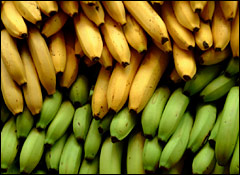Dear Umbra,
Why are organic bananas always smaller and almost always greener than non-organic?
BG
Tallahassee, Fla.
Dearest BG,
Hmm. Fresh organic fruits and vegetables often differ in appearance from their conventionally grown kin. They’re the hippies of the produce world: unwaxed, expressing their individualism, coming to the produce stand as they are, lumps and all. Although I notice this has changed some over the past couple decades as organic farming has become industrialized and the produce has become more uniform.
Smaller size can be a result of organic production methods. When a conventional plant receives synthetic substances targeted at maximum fruit production, and a farmer can apply pesticides whenever a sickly plant (fed on little of substance) starts to lag, the fruit can get quite large. Organic farmers have to pay a bit more attention to the health of the whole farm, the whole plant, and can’t just push plants to the max. As a result the fruit is smaller. I’m not claiming to know much about banana production, but I have seen this effect with other produce. So I think organic bananas may be smaller than conventional bananas because — well, probably because organic banana plants are healthier. Those gigantic bananas to which we are accustomed are just plain old weird.
There are other reasons for different appearances in organic fruit. The variety of fruit might be unusual — say, you might be seeing a Jonagold variety apple instead of only Red Delicious. I thought this might be the reason for your smaller banana. I now believe that all the basic yellow sweet bananas in the same general size are the Cavendish variety. Cavendish completely dominates the export banana markets, and the other bananas we might see look fairly different: smaller, fatter, green.
Other reasons for a different appearance in organics would be fewer pesticides and fertilizers leading to a less cartoonishly perfect fruit; or maybe no waxing leading to a less blindingly shiny fruit. I don’t, however, think “greener” counts as less perfect with bananas. You know that bananas are picked unripe and shipped from somewhere tropical to you. In order to sell, the bananas must be close to ripe by the time they reach the store, but not too ripe. Apparently it’s quite tricky to get the timing right. Much of banana shipping is done under refrigeration. So, another batch of assumptions here, your bananas may be greener due to the habits of the vendor. That organic banana vendor just keeps things a little greener. It could be — could be — that organic farmers have to ship their bananas greener because there’s a ripening retardation chemical they can’t use under organic certification, but I looked pretty hard and could not confirm that theory of mine.
We should all know a little more about bananas, which are the world’s most popular fruit — and thought to be one of the world’s oldest as well. Banana plants are not trees. They are giant herbs, just as if oregano grew 25 feet tall. The cluster we buy at the store was once part of a larger cluster called a “hand.” They are incredibly popular and also incredibly important as a basic foodstuff. Most are grown in developing countries, with Ecuador, the Philippines, Costa Rica, and Colombia dominating the export market. However, exports make up only 15 percent of world banana production, which totals 115 million tons! The rest are grown for local sales or for home cooking.
There shouldn’t be anything wrong with your greener bananas. Take ’em home, let them ripen at room temperature for a few days, and then have a tasty snack. Keep buying organic, especially as it benefits the health and living environment of the producers. As we have discussed in the past, however, if you have a limited budget or are desperate for fruit in a place without organics, you can prioritize your purchases — and bananas are an OK choice for buying conventionally grown, as they have less pesticide residue than other choices.
Handily,
Umbra



